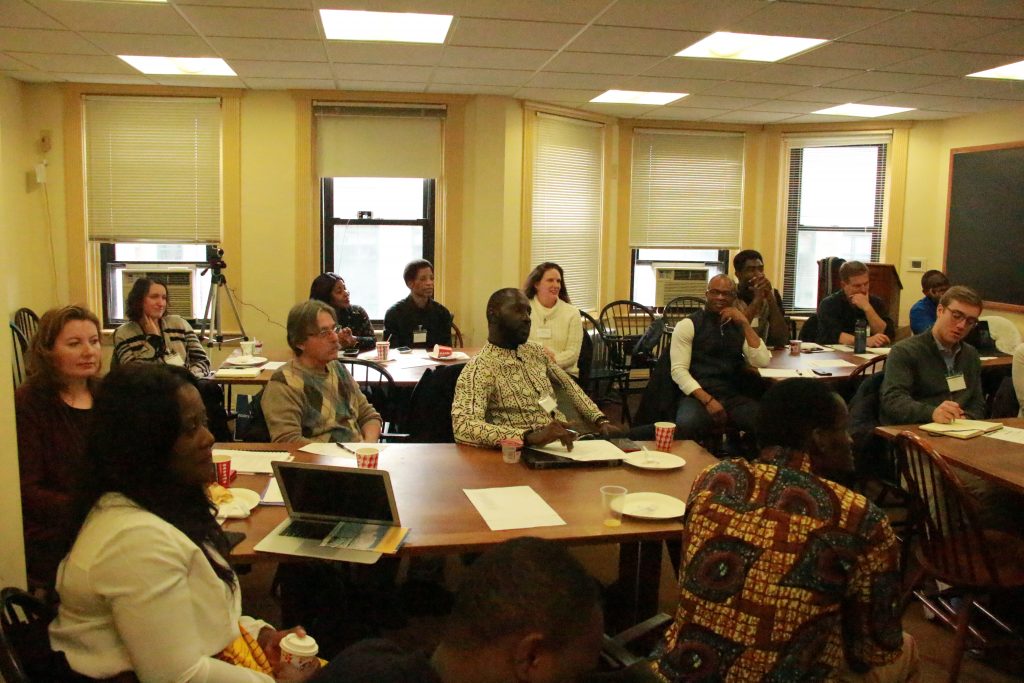On Saturday, January 19, 2019, the Boston University African Studies Center (ASC) and its Diaspora Studies Initiative hosted a breakfast meeting for the African Diaspora Engaging Africa (ADEA) Initiative. The ADEA Initiative seeks to build a supportive platform for the African Diaspora in the US to engage in Africa’s development. This initiative creates a diverse and productive community of African Diaspora practitioners living in the Greater Boston area and involved in development projects in Africa to share experience, resources and foster collaboration. As an African Diaspora engagement effort, it aims to build the capacity and support for the African Diaspora to realize its potential as a crucial partner of Africa’s development. The ADEA initiative defines African diaspora as anyone with ancestral ties to Africa or who lived in the continent long enough to have gained knowledge and experience of the local population and conditions and are willing to contribute to the development of the African Continent.
The first breakfast meeting was meant to bring the practitioners together while developing the ADEA Initiative’s vision and working out the mechanics of a Community of Practice. Mr. Emmanuel Owusu, leader of the ADEA Initiative, presented a comprehensive vision of the Initiatives’ future activities, including capacity building and benchmarking, resources development, diaspora engagement, forging of partnerships with African institutions and development partners, and allying with academic partners. ADEA members shared their activities and discussed success stories and challenges. The hosts of the workshop from the BU side elaborated on the history and current activities around African Studies and Diaspora. Dr. Daivi Rodima-Taylor of the BU ASC Diaspora Studies Initiative provided an overview of the topics studied and activities facilitated by the program. Dr. Eric Schmidt, Assistant Director of the ASC, talked about the history and resources of the African Studies Center and possibilities for engagement with the Boston University academic community.
The initial projects in the ADEA Initiative included STEM-based childhood education projects; orphans and the people with disabilities support projects; rural youth empowerment initiatives; music projects; initiatives dealing with medical, first aid, and sanitation issues; projects organizing book donations to schools and libraries; and anti-corruption initiatives. The projects partnered with communities and institutions in countries all over the Africa continent, including Kenya, Tanzania, Ghana, Nigeria, Rwanda, Guinea, Uganda, Mali, and Togo, to name a few.
Participants commented on the workshop as follows:
“The ADEA Community of Practitioners first meeting was full of energy, enthusiasm and great ideas. I am extremely grateful to the Visionary, Emmanuel Owusu, for working with the Boston University African Studies Department to put together such an impactful meeting. I left invigorated and inspired to continue the work we do in Africa. I am proud to be a member of this community. I believe we will support, inspire and empower each other. I am eager to contribute to the success of this dream team.” – Lynn Dadzie-Yeboah, Alexis Miranda Foundation, operating in Ghana
“The first gathering of ADEA Community of Practitioners was inspiring and we thank Emmanuel Owusu for his vision. It was encouraging to see fifty organizations represented and to know all of us are engaged in various development projects in Africa. Whether hearing about providing clean water, helping students access STEM classes, caring for orphans or any of the many other initiatives, we were encouraged just by coming together and sharing a common commitment to development in Africa. We look forward to networking further within this group.” – Deborah Brown, Executive Director, Kulea Villages, operating in Tanzania and Kenya
“The African Bridge Network and BU’s African Studies Center have set a very appetizing table for all of us! Now the question is how we can all take advantage of the opportunities … which seem to be almost endless! Already from the first meeting I’m in touch with some other initiatives and we even see possible collaborations that can strengthen our efforts.” – Todd Fry, Rwanda Youth Partnership, working with Rungano-Ndota Initiative, operating in Rwanda
The community of practice and the breakfast meetings continue to the main means for gathering, support and collaboration for ADEA. Members continue to hold quarterly breakfast meetings at Boston University. With the advent of the COVID19 pandemic, the members meet monthly on virtual breakfast meetings to support each other in navigating the pandemic’s impact on their operations in Africa. The membership of the ADEA community of practice has expanded beyond the Greater Boston area.
Contact Emmanuel Owusu at Emmanuel@africanbn.org with an inquiry about ADEA.

